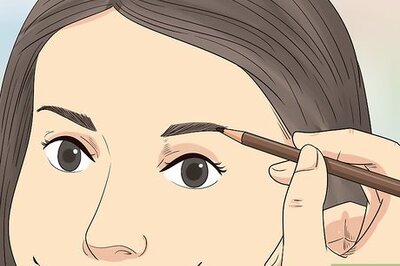
views
Improving Your Pronunciation
Speak to educated English-speakers. Education is not the most important part of learning proper English by any means, but people with extensive educations do often have a strong grasp on the rules of grammar and syntax. Speak to well-educated people, like your teachers, your family members, or even nice strangers to hear what English is supposed to sound like.Tip: Listen to how these people form their words and note the way their lips move, their pronunciation, and their rhythm and intonation. Try to mimic how these people speak. It may feel strange or awkward at first, but with practice it will become second nature.
Listen to podcasts and audiobooks. English speakers who are recording their voices will pay extra attention to their pronunciation and how they are saying a word. Read along with an audiobook to see how each word is pronounced, or listen to an educational podcast for a more conversational tone. You can even stop the recording and repeat new words until you get them right.
Pronounce the endings of words. A common mistake many native and non-native English speakers make is not pronouncing the endings of words. Try over-enunciating the endings of words at first, then relax a little. Dropping the ends of words makes the language more informal, since some of them can be versions of slang words. For instance, instead of saying "goin’,” say "going.” Instead of saying "makin’," say "making.”
Practice tongue-twisters. To practice your pronunciation and moving from word to word quickly as you speak, say some tongue-twisters to yourself once a day. Practice ones that rely heavily on different letters and pronunciations so that you get a well-rounded practice. Common tongue-twisters include: “Sally sells seashells down by the sea shore.” ”Peter Piper picked a peck of pickled peppers.” ”How much wood would a woodchuck chuck if a woodchuck could chuck wood?” Tongue-twisters are notoriously difficult to say, even for native English speakers. Don’t get discouraged if it takes some practice to get these right.
Using Proper Grammar
Include a subject, verb, and object word in your sentence. Sentences can be as long and complex as you make them, but they must include 3 main components to be classified as a sentence. A subject is usually a noun that is doing something described by a verb. An object word is what the verb is modifying. In the sentence “He obtained his degree,” “He” is the subject, “obtained” is the verb, and “degree” is the object word. In “She likes rice pudding,” “She” is the subject, “likes” is the verb, and “rice pudding” is the object word.
Use pronouns that agree with the noun. Pronouns are words that you use in place of the names of a person, place, thing, or idea. Using someone’s name or an object’s description can get repetitive, so use pronouns like “she,” “he,” and “it” to replace them. If your noun is plural, use a plural pronoun. If it is singular, use a singular pronoun. In “Maisy read the book so she could study for her test,” “she” is a singular pronoun because “Maisy” is 1 person. In “When students arrive on the first day of school, they need help finding the classroom,” “they” is a plural pronoun because “students” refers to multiple people.
Use "I" and "me" in the correct context. “I” is used when you are the one doing the action in the sentence. “Me” is used when the action is being done to you in a sentence. These pronouns can be confusing since they both refer to the same person: yourself. Try not to mix these up. For example, if you said, “I studied for the test,” you are the one doing the studying, so using "I" is correct. “Me studied for the test” is incorrect. In “She took me home,” “me” is being taken home. “She took I home” is incorrect.
Speak in the past, present, or future tense. The English language has “tenses” that are determined by when the action in the sentence is happening. Most often, the tense is either the past, the present, or the future. Keep the tense the same throughout your sentence and do not mix tenses. An example of past tense is: “I drove home yesterday.” “Drove” is in the past tense. Present tense is: “I drive home every day.” “Drive” is in the present tense. Future tense is: “I will drive home later today.” “Will drive” is in the future tense.
Take a writing or grammar class. Taking grammar classes will teach you how to form complete sentences with proper grammar. They’ll also improve your writing ability and vocabulary. The more you practice writing and reading, the more you will be able to understand the grammar when constructing sentences both in text and in speech. Bad sentence structure will be more noticeable to you, and it will be more likely that good grammar will stay committed in your memory. Check with your local community college to see if they have any writing or grammar classes you can take.
Improving Your Vocabulary
Read books in English. Reading is a great way to expand your vocabulary while also understanding the correct context of words. Seeing different words used in a sentence is much more helpful than just looking them up. Check out a popular book in English from your local library, or visit a book store near you to see what grabs your attention. Use a dictionary while reading so you can look up any words you don't understand. Read material that you find interesting. Novels, newspapers, or even comic books are great ways to learn English words.
Describe people or objects to practice new words. As you learn new words in English, you may be presented with opportunities to use them in your daily life. Try to describe objects or people with really specific words. Instead of using small describing words like, "the building over there is big," use more eloquent words that convey more meaning. For example: "the building over there is gigantic."Tip: Try looking up words in a thesaurus to find ones that have similar definitions. Instead of saying, “The sun is bright,” try saying, “The sun is radiant today.” Instead of “She looks thin,” try saying, “She looks delicate and fragile.”
Label your household items until you know their names. If you're a non-native English speaker, it can be difficult to remember even basic words. A good way around this is to make labels for everyday household items which contain the English word and its pronunciation. Label things that you use every day so that you can commit them to memory. Items like your toothbrush, mirror, chair, or bed are great things to label.
Download a vocabulary app to teach you new words. It can be tough to find new words in your daily life that you haven’t already come across. Download an app on your phone that will teach you 1 new word per day. Write down or memorize each word and its definition to expand your vocabulary on a daily basis. PowerVocab and Word to Word are 2 popular vocabulary teaching apps.
Don't use the word "like" as a filler. When you are telling a story or speaking for a long time, you may want to pause in between your words or sentences. A common mistake people make is using the word “like” to fill the pauses as they talk. Only use the word “like” when you are expressing that you like something or when you are comparing things. An incorrect use of the word "like" would be: "The other day I got on this, like, bus and went to, like, Southampton to meet my, like, boyfriend." The correct use of the word "like" would be: "I like biscuits and I also like American cookies." Another correct use of the word “like” is: “Her hair was pretty, like golden straw.”
Avoid using curse words. Frequently using curse words or bad language does not give a good impression, especially in polite company. Expanding your vocabulary should help you to find alternative words to express yourself. If you can expand your vocabulary, you can eliminate swearing altogether. Once you accomplish this, you'll often find that in most everyday situations, there is no need to swear at all.Tip: If you can't stop cursing, sometimes it is helpful to use another word in place of a curse word. Try saying, "Aw, sassafras!" It sounds weird, but it is better than cursing.



















Comments
0 comment